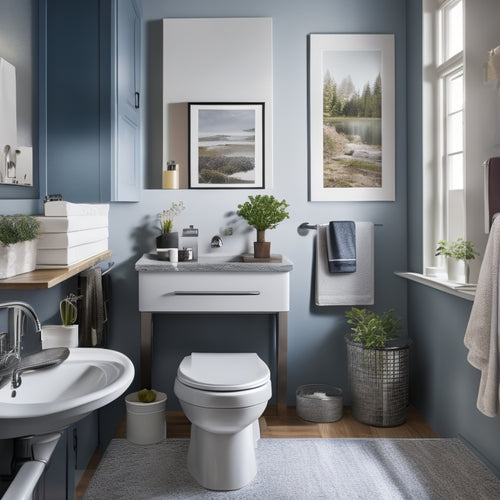
Unlock Your Child's Organizational Potential Today
Share
Unleashing your child's organizational potential requires a tailored approach that recognizes their unique learning style and needs. Every child possesses an inherent organizing personality, and understanding this is essential for developing personalized strategies. By creating a conducive learning environment, teaching essential organizing skills, and establishing a home organization system, you can help your child cultivate successful habits. Consistency and accountability are important for maintaining these systems, leading to a sense of accomplishment and confidence. By adopting a customized approach, you can empower your child to reach their full organizational potential, and discover the key to unlocking their academic and personal success.
Key Takeaways
• Identify your child's unique organizing style to develop personalized strategies that cater to their learning preferences.
• Create a conducive learning environment that aligns with their style, reducing distractions and improving time management.
• Teach essential organizing skills tailored to your child's strengths and weaknesses, laying the foundation for academic and personal success.
• Establish a home organization system that provides structure and promotes responsibility, independence, and lifelong skills.
• Maintain consistency and accountability through regular goal-setting, progress tracking, and motivational check-ins.
Identify Your Child's Organizing Style
Understanding your child's unique organizational style is the foundation upon which effective habits and systems are built. It allows you to tailor your approach to their individual needs and learning preferences.
Every child has an inherent organizing personality that influences how they process and manage information. By recognizing your child's organizing personality, you can create personalized strategies that cater to their strengths and weaknesses.
For instance, some children may be visual learners, benefiting from colorful labels and diagrams, while others may be more tactile, responding well to hands-on activities. By acknowledging these differences, you can develop a customized approach that resonates with your child, fostering a deeper understanding of their learning preferences and promoting successful organizational habits.
Create a Conducive Learning Environment
By intentionally designing a learning space that aligns with your child's unique organizing style, you can greatly enhance their ability to focus, process information, and retain knowledge. A well-organized study area can help reduce distractions, improve time management, and boost overall academic performance. Consider the following essential elements when designing a conducive learning environment:
| Aspect | Design Consideration | Organizing Tip |
|---|---|---|
| Study Space | Dedicated area with minimal clutter | Assign a specific area for studying |
| School Supplies | Organized storage for easy access | Use labeled bins and baskets |
| Visual Aids | Visual reminders and motivational quotes | Create a vision board or goal chart |
| Ergonomics | Comfortable seating and proper lighting | Adjust chair height and lighting levels |
| Technology | Designated area for devices and chargers | Use a cord organizer and charging station |
Teach Essential Organizing Skills
Developing organization is a skill that can be cultivated and refined through deliberate practice, patience, and persistence, laying the foundation for a lifetime of academic and personal success.
To harness your child's organizational potential, it is essential to teach them essential organizing skills that cater to their unique needs and learning style. A customized approach allows you to tailor your teaching to your child's strengths and weaknesses, ensuring they develop a personalized system that works for them.
Establish a Home Organization System
Once your child has acquired fundamental organizing skills, the next step is to establish a home organization system that provides a structured framework for maintaining order and consistency in their daily lives.
This system should incorporate age-appropriate organizing techniques tailored to your child's unique needs and learning style. Customized solutions can be developed using effective tools such as color-coded labels, charts, and checklists.
By implementing a home organization system, your child will learn to prioritize tasks, manage time, and develop habits that promote responsibility and independence.
As your child grows and matures, this system can be adapted to accommodate their changing needs, providing a solid foundation for lifelong organizational skills.
Maintain Consistency and Accountability
A well-maintained home organization system relies on consistent habits and accountability to guarantee that organizational skills are reinforced and become an integral part of your child's daily routine.
To achieve this, set goals and track progress regularly. Establishing a routine of regular check-ins and progress evaluations will help your child stay on track and motivated.
This accountability will also encourage them to take ownership of their organizational tasks, leading to a sense of accomplishment and confidence.
Frequently Asked Questions
How Can I Motivate My Child to Maintain Their Organized Space?
To motivate your child to maintain their organized space, implement positive reinforcement by praising their efforts and accomplishments, and foster personal accountability by setting clear expectations and encouraging self-reflection on their organizational choices.
What if My Child Has ADHD or Other Organizational Challenges?
As a puzzle piece fits snugly into place, so too can your child's unique strengths and challenges be accommodated, illuminating a path to organization; by identifying strengths and accommodating struggles, tailored strategies can be crafted to empower your child's organizational journey.
Can I Adapt These Strategies for Children With Special Needs?
When adapting organizational strategies for children with special needs, incorporate Accommodation Strategies and Inclusive Systems to foster a supportive environment, acknowledging individual differences and promoting equal access to organization tools and resources.
How Do I Balance Being Supportive Without Doing the Work for Them?
'Did you know that 75% of children with ADHD struggle with organization skills? Establishing clear parental boundaries is essential to avoid overhelping consequences, enabling children to develop autonomy and self-advocacy skills, ultimately leading to long-term independence.'
What Are Some Fun Organization Activities to Do With My Child?
Engage your child in fun organization activities, such as color coding tasks or using label makers to categorize belongings, fostering a sense of ownership and responsibility while promoting essential life skills.
Related Posts
-

Revamp Your Home With Spring Cleaning Checklist
Spring's arrival presents a prime opportunity to transform your living space, shedding the remnants of winter's hiber...
-

Farm Family's Organized Office: A Detailed Look
I've created a well-organized office space that helps my farm family stay productive and focused. My desk is organize...
-

Bathroom Planner Workbook Review: A Home Project Manager
The Bathroom Planner Workbook is a game-changer for homeowners seeking a stress-free bathroom remodel. This all-encom...


